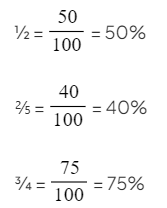Class 10 Exam > Class 10 Notes > Mathematics for GCSE/IGCSE > Basic Percentages
Basic Percentages | Mathematics for GCSE/IGCSE - Class 10 PDF Download
What is a percentage?
- "Percent" simply means "divided by 100" (or "out of 100").
- You can think of a percentage as a standardized way of expressing a fraction – always expressed out of 100.
- This makes it useful for comparing fractions. For example:

How do I work out basic percentages of amounts?
- You can use simple equivalences to calculate percentages without a calculator:
- 50% = 1/2 Divide the number by 2
- 25% = 1/4 Divide the number by 4
- 20% = 1/5 Divide the number by 5
- 10% = 1/10 Divide the number by 10
- 5% = 1/20 Find 10%, then divide by 2
- 1% = 1/100 Divide the number by 100, and so on
- Building Up Complex Percentages: 17% = 10% + 5% + 2 * 1%
How do I find any percentage of an amount?
- Method 1: You can calculate any percentage of an amount by dividing the amount by 100 and then multiplying by the given percentage.
- Example: To find 23% of 40, calculate 40 ÷ 100 = 0.4, then multiply by 23: 0.4 * 23 = 9.2
- Method 2: To find "a percentage of X," multiply X by the decimal equivalent of that percentage (percentage ÷ 100).
- Example: 23% of 40 is calculated as 40 * 0.23 = 9.2
- To find "A as a percentage of B": Divide A by B to get a decimal, then multiply by 100.
- Example: To find 26 as a percentage of 40, first calculate 26 ÷ 40 = 0.65, then multiply by 100 to get 65%. Therefore, 26 is 65% of 40.
Question for Basic PercentagesTry yourself: How can you calculate 17% of a number?View Solution
The document Basic Percentages | Mathematics for GCSE/IGCSE - Class 10 is a part of the Class 10 Course Mathematics for GCSE/IGCSE.
All you need of Class 10 at this link: Class 10
|
38 videos|413 docs|19 tests
|
FAQs on Basic Percentages - Mathematics for GCSE/IGCSE - Class 10
| 1. What is a percentage? |  |
Ans. A percentage is a way of expressing a number as a fraction of 100. It is often used to compare quantities and represent proportions.
| 2. How do I work out basic percentages of amounts? |  |
Ans. To work out basic percentages of amounts, you can multiply the amount by the percentage you want to find as a fraction (e.g., 25% is 0.25) and then convert the result back to a percentage.
| 3. How do I find any percentage of an amount? |  |
Ans. To find any percentage of an amount, you can multiply the amount by the desired percentage as a decimal (e.g., 20% is 0.20) to get the result.
| 4. How can percentages be used in everyday life? |  |
Ans. Percentages are commonly used in everyday life for calculating discounts, sales tax, tips, interest rates, and analyzing data in fields like finance, economics, and statistics.
| 5. Why are percentages important in mathematics and real-world applications? |  |
Ans. Percentages are important in mathematics and real-world applications because they provide a standardized way to compare quantities, analyze data, and make informed decisions based on proportional relationships.
Related Searches
















